外研版(2019)必修第二册Unit 3 On the move动词不定式作定语和结果状语课件(14张ppt)
文档属性
| 名称 | 外研版(2019)必修第二册Unit 3 On the move动词不定式作定语和结果状语课件(14张ppt) |  | |
| 格式 | pptx | ||
| 文件大小 | 1.3MB | ||
| 资源类型 | 教案 | ||
| 版本资源 | 外研版(2019) | ||
| 科目 | 英语 | ||
| 更新时间 | 2023-01-05 00:47:02 | ||
图片预览

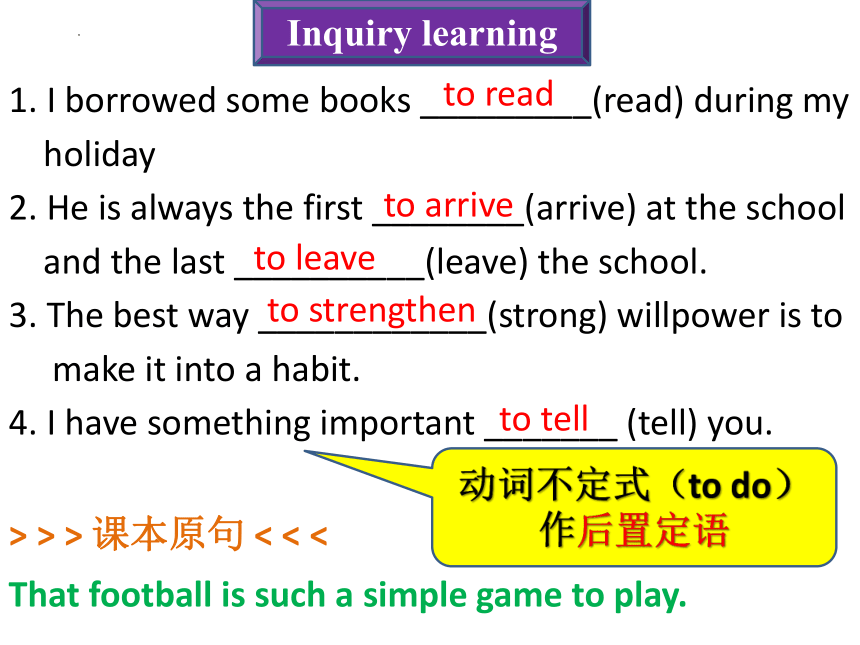
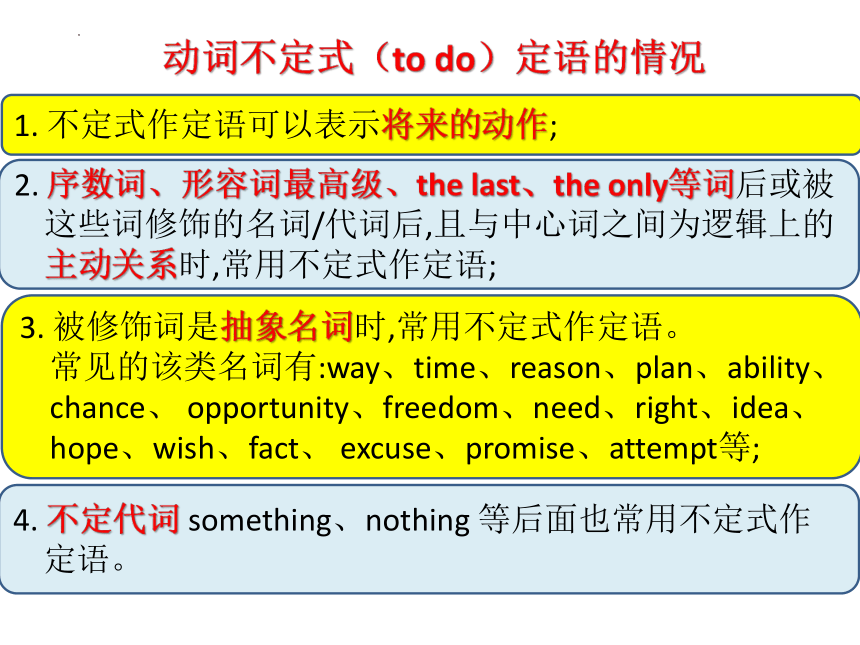
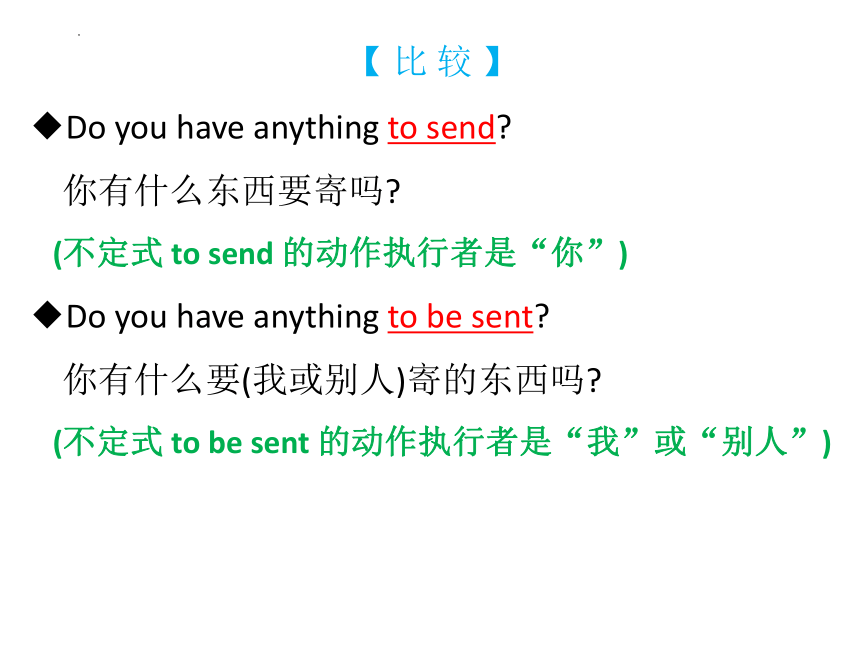
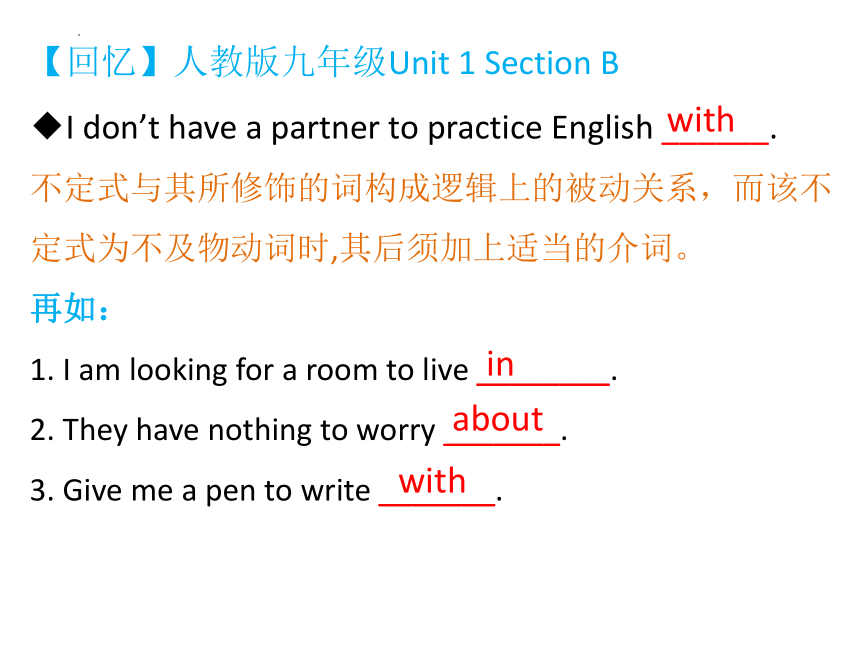
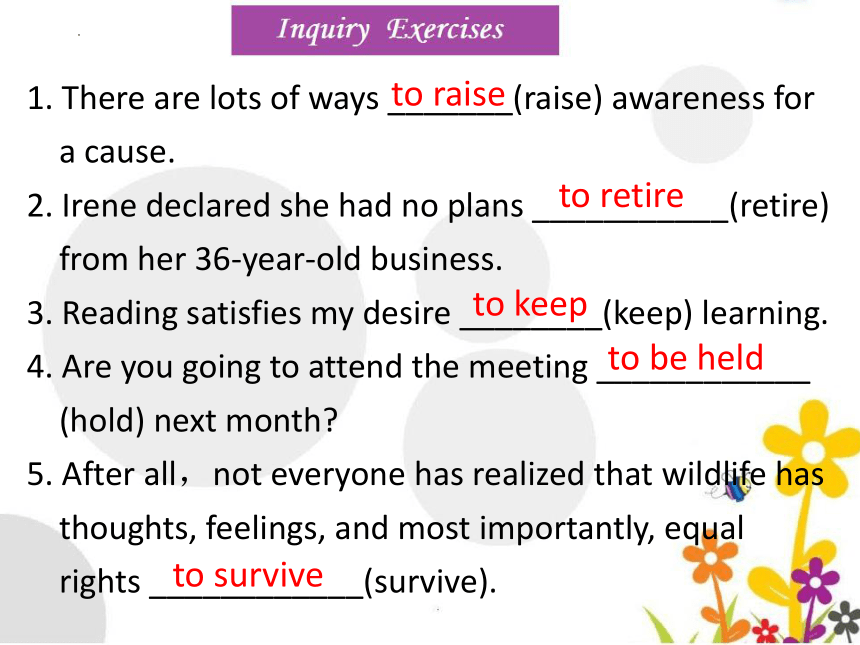
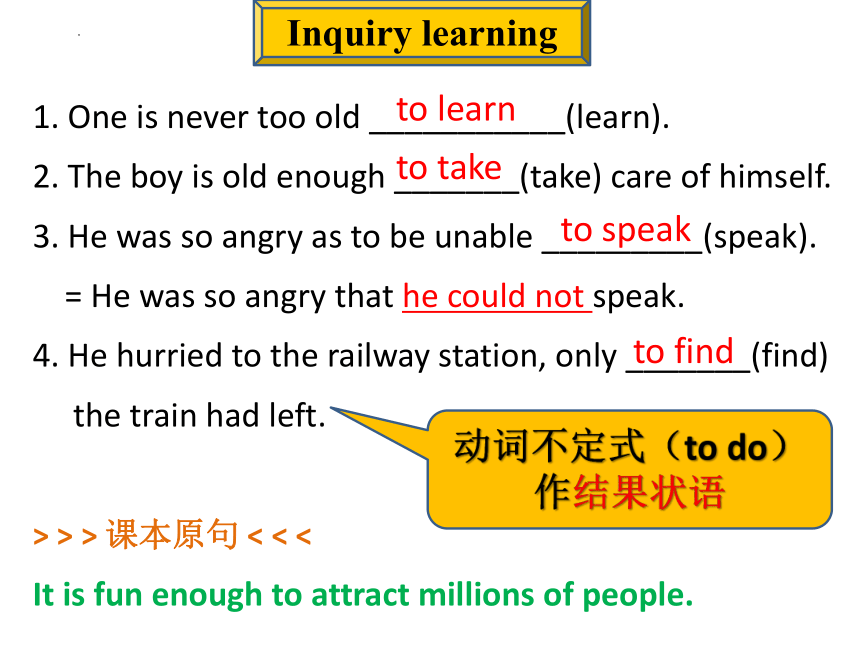
文档简介
(共14张PPT)
Unit 3 On the move
Language
Points
1. I borrowed some books _________(read) during my
holiday
2. He is always the first ________(arrive) at the school
and the last __________(leave) the school.
3. The best way ____________(strong) willpower is to
make it into a habit.
4. I have something important _______ (tell) you.
> > > 课本原句 < < <
That football is such a simple game to play.
动词不定式(to do)
作后置定语
Inquiry learning
to read
to arrive
to leave
to strengthen
to tell
动词不定式(to do)定语的情况
1. I borrowed some books to read during my holiday
2. He is always the first to arrive at the school and the
last to leave the school.
3. The best way to strengthen willpower is to make it
into a habit.
4. I have something important to tell you.
1. 不定式作定语可以表示将来的动作;
2. 序数词、形容词最高级、the last、the only等词后或被
这些词修饰的名词/代词后,且与中心词之间为逻辑上的
主动关系时,常用不定式作定语;
3. 被修饰词是抽象名词时,常用不定式作定语。
常见的该类名词有:way、time、reason、plan、ability、
chance、 opportunity、freedom、need、right、idea、
hope、wish、fact、 excuse、promise、attempt等;
4. 不定代词 something、nothing 等后面也常用不定式作
定语。
【 比 较 】
◆Do you have anything to send
你有什么东西要寄吗
(不定式 to send 的动作执行者是“你”)
◆Do you have anything to be sent
你有什么要(我或别人)寄的东西吗
(不定式 to be sent 的动作执行者是“我”或“别人”)
【回忆】人教版九年级Unit 1 Section B
◆I don’t have a partner to practice English ______.
不定式与其所修饰的词构成逻辑上的被动关系,而该不定式为不及物动词时,其后须加上适当的介词。
再如:
1. I am looking for a room to live ________.
2. They have nothing to worry _______.
3. Give me a pen to write _______.
with
in
about
with
1. There are lots of ways _______(raise) awareness for
a cause.
2. Irene declared she had no plans ___________(retire)
from her 36-year-old business.
3. Reading satisfies my desire ________(keep) learning.
4. Are you going to attend the meeting ____________
(hold) next month
5. After all,not everyone has realized that wildlife has
thoughts, feelings, and most importantly, equal
rights ____________(survive).
to raise
to retire
to keep
to be held
to survive
1. One is never too old ___________(learn).
2. The boy is old enough _______(take) care of himself.
3. He was so angry as to be unable _________(speak).
= He was so angry that he could not speak.
4. He hurried to the railway station, only _______(find)
the train had left.
> > > 课本原句 < < <
It is fun enough to attract millions of people.
to learn
Inquiry learning
动词不定式(to do)
作结果状语
to take
to speak
to find
【小结】不定式作结果状语常用于下列结构中:
1. too...to do...(太……而不能做……)
2. enough to do...(足够做……);
3. so/such...as to do...(如此……以至于做……)。
4. only to do...(结果却做……);
【 比 较 】
1. The heavy rain lasted a whole day, _______(make) a
serious flood for the village.
2. I hurried to the supermarket, only _________(find) it
was closed.
3. She got home ________(learn) that her grandpa has
passed.
◆现在分词(短语)作结果状语:常常表示“自然而然、
意料之中或顺理成章”的结果。
◆不定式作结果状语:往往表示意想不到、不希望出
现的结果。to 前常加 only加重失望的情绪。
making
to find
to learn
1. No words are strong enough ____________(convey)
how grateful I am.
2. He hurried to the booking office only _________(tell)
all the tickets had been sold out.
3. He shut himself in the room so as not ____________
(disturb).
4. He returned home __________(learn) his daughter
had just been engaged.
5. Dinosaurs have completely died out on the earth,
never _____________(see) again.
to convey
to be told
to be disturbed
to learn
to be seen
Summary
不定式的两种用法
1. 作后置定语(常见情况4种?)
2. 作结果状语(常见结构4种?)
★to do与doing作状语的区别?
Mr. Smith's eagerness ______(get) back to teach at the school was quite obvious.
2. Unless you can sleep well, you will lose the ability
________(focus), plan and stay motivated after
one or two nights.
3. It’s never too early _________(make) necessary
preparations for a healthy and meaningful college
experience.
4. His parents died, ________(leave) him an orphan.
to get
to focus
to make
leaving
5. Unlike traditional gyms, app-backed gyms offer
people flexible options _____________(exercise).
6. The case was too heavy ______________(carry)
by a child.
7. The medical team _____________(send) to the
flooded-stricken areas will start off next month.
8. I don't see any reason ___________(give) up work.
9. Father always bought his son some toys to play
______ after his business.
to exercise
to be carried
to be sent
to give
with
Unit 3 On the move
Language
Points
1. I borrowed some books _________(read) during my
holiday
2. He is always the first ________(arrive) at the school
and the last __________(leave) the school.
3. The best way ____________(strong) willpower is to
make it into a habit.
4. I have something important _______ (tell) you.
> > > 课本原句 < < <
That football is such a simple game to play.
动词不定式(to do)
作后置定语
Inquiry learning
to read
to arrive
to leave
to strengthen
to tell
动词不定式(to do)定语的情况
1. I borrowed some books to read during my holiday
2. He is always the first to arrive at the school and the
last to leave the school.
3. The best way to strengthen willpower is to make it
into a habit.
4. I have something important to tell you.
1. 不定式作定语可以表示将来的动作;
2. 序数词、形容词最高级、the last、the only等词后或被
这些词修饰的名词/代词后,且与中心词之间为逻辑上的
主动关系时,常用不定式作定语;
3. 被修饰词是抽象名词时,常用不定式作定语。
常见的该类名词有:way、time、reason、plan、ability、
chance、 opportunity、freedom、need、right、idea、
hope、wish、fact、 excuse、promise、attempt等;
4. 不定代词 something、nothing 等后面也常用不定式作
定语。
【 比 较 】
◆Do you have anything to send
你有什么东西要寄吗
(不定式 to send 的动作执行者是“你”)
◆Do you have anything to be sent
你有什么要(我或别人)寄的东西吗
(不定式 to be sent 的动作执行者是“我”或“别人”)
【回忆】人教版九年级Unit 1 Section B
◆I don’t have a partner to practice English ______.
不定式与其所修饰的词构成逻辑上的被动关系,而该不定式为不及物动词时,其后须加上适当的介词。
再如:
1. I am looking for a room to live ________.
2. They have nothing to worry _______.
3. Give me a pen to write _______.
with
in
about
with
1. There are lots of ways _______(raise) awareness for
a cause.
2. Irene declared she had no plans ___________(retire)
from her 36-year-old business.
3. Reading satisfies my desire ________(keep) learning.
4. Are you going to attend the meeting ____________
(hold) next month
5. After all,not everyone has realized that wildlife has
thoughts, feelings, and most importantly, equal
rights ____________(survive).
to raise
to retire
to keep
to be held
to survive
1. One is never too old ___________(learn).
2. The boy is old enough _______(take) care of himself.
3. He was so angry as to be unable _________(speak).
= He was so angry that he could not speak.
4. He hurried to the railway station, only _______(find)
the train had left.
> > > 课本原句 < < <
It is fun enough to attract millions of people.
to learn
Inquiry learning
动词不定式(to do)
作结果状语
to take
to speak
to find
【小结】不定式作结果状语常用于下列结构中:
1. too...to do...(太……而不能做……)
2. enough to do...(足够做……);
3. so/such...as to do...(如此……以至于做……)。
4. only to do...(结果却做……);
【 比 较 】
1. The heavy rain lasted a whole day, _______(make) a
serious flood for the village.
2. I hurried to the supermarket, only _________(find) it
was closed.
3. She got home ________(learn) that her grandpa has
passed.
◆现在分词(短语)作结果状语:常常表示“自然而然、
意料之中或顺理成章”的结果。
◆不定式作结果状语:往往表示意想不到、不希望出
现的结果。to 前常加 only加重失望的情绪。
making
to find
to learn
1. No words are strong enough ____________(convey)
how grateful I am.
2. He hurried to the booking office only _________(tell)
all the tickets had been sold out.
3. He shut himself in the room so as not ____________
(disturb).
4. He returned home __________(learn) his daughter
had just been engaged.
5. Dinosaurs have completely died out on the earth,
never _____________(see) again.
to convey
to be told
to be disturbed
to learn
to be seen
Summary
不定式的两种用法
1. 作后置定语(常见情况4种?)
2. 作结果状语(常见结构4种?)
★to do与doing作状语的区别?
Mr. Smith's eagerness ______(get) back to teach at the school was quite obvious.
2. Unless you can sleep well, you will lose the ability
________(focus), plan and stay motivated after
one or two nights.
3. It’s never too early _________(make) necessary
preparations for a healthy and meaningful college
experience.
4. His parents died, ________(leave) him an orphan.
to get
to focus
to make
leaving
5. Unlike traditional gyms, app-backed gyms offer
people flexible options _____________(exercise).
6. The case was too heavy ______________(carry)
by a child.
7. The medical team _____________(send) to the
flooded-stricken areas will start off next month.
8. I don't see any reason ___________(give) up work.
9. Father always bought his son some toys to play
______ after his business.
to exercise
to be carried
to be sent
to give
with
